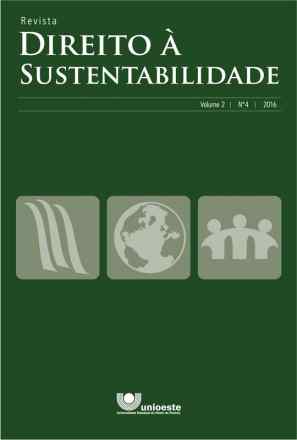RESPONSABILIDADE PENAL DA PESSOA JURÍDICA: SUA RELAÇÃO COM A POLUIÇÃO HÍDRICA FRENTE AO PRINCÍPIO DA EQUIDADE INTERGERACIONAL
Revista Direito à Sustentabilidade
RESPONSABILIDADE PENAL DA PESSOA JURÍDICA: SUA RELAÇÃO COM A POLUIÇÃO HÍDRICA FRENTE AO PRINCÍPIO DA EQUIDADE INTERGERACIONAL
Autor Correspondente: Jessica Lopes Ferreira Bertotti | [email protected]
Palavras-chave: Poluição HÃdrica. PrincÃpio da Equidade Intergeracional. Responsabilidade Penal. Pessoa JurÃdica.
Resumos Cadastrados
Resumo Português:
Encontra-se em voga a preocupação com o Meio Ambiente em todas as suas áreas e extensões. Porém, um dos problemas que por vezes se mantém sublimado é o da poluição hÃdrica, por vezes causadas pelas empresas. Essa preocupação se agrava quando se dá conta de que já é discutida amplamente a escassez de água em estados de protagonismo nacional, como São Paulo e Ceará. Portanto, o problema estendeu-se pelo território nacional, e se há escassez de água, a proteção e qualidade dela devem receber ainda mais ênfase e cuidado. Diante desse cenário partiu-se, portanto, do seguinte problema de pesquisa: De que maneira a poluição hÃdrica contrapõe-se ao princÃpio da equidade intergeracional e de que forma o Direito Processual Penal Brasileiro trata a questão da responsabilidade da pessoa jurÃdica. Tem-se como objetivo geral trazer de que maneira é tratada a questão da poluição hÃdrica no âmbito jurÃdico penal brasileiro com relação à s pessoas jurÃdicas, assim como conceituar o princÃpio da equidade intergeracional e sua importância para que ocorra a efetiva proteção à sadia condição das águas. Justifica-se a presente pesquisa por sua importância, afinal, faltam pesquisas relacionadas à extensão que o problema da poluição hÃdrica pode alcançar, pois a poluição pode, inclusive, ser transfonteiriça, prejudicando assim não apenas o paÃs poluidor, como toda a coletividade, demonstrando então que esse é um problema a ser discutido, inclusive para além de fronteiras. Com relação aos resultados alcançados, tem-se que a responsabilização penal da pessoa jurÃdica de direito privado nos casos de poluição hÃdrica ainda encontra falta de regras processuais e procedimentos especÃficos. Entretanto, a partir da produção desta pesquisa, não se entendeu isso como um problema, afinal o ordenamento jurÃdico deve ser visto como um todo, sendo que nele se encontram respostas adequadas para o tratamento da questão, desde que cuidadosamente observadas as diferenças existentes entre as diversas disciplinas processuais. Sempre se lembrando do respeito aos princÃpios constitucionais, como o princÃpio da equidade intergeracional esmiuçado no decorrer do artigo. A metodologia aplicada no desenvolvimento desta pesquisa compreende o método cartesiano, com relação à coleta de dados e no final do artigo o método indutivo, com auxÃlio das técnicas do referente, da categoria, dos conceitos operacionais, da pesquisa bibliográfica e do fichamento.
Resumo Inglês:
It is in vogue the concern about the environment in all of its areas and
extensions. However, one of the problems that occasionally remain sublimed is the
water pollution, which is sometimes caused by companies. This concern is aggravated
when it is noticed that the scarcity of water is widely discussed in states of National
prominence, such as São Paulo and Ceara. Hence, the problem has spread nationally,
and if the shortage of water exists, to its protection and quality must be given even more
emphasis and care. Facing this scenario, therefore, the following question was raised:
in what way does the water pollution oppose to the principle of intergenerational
equity and how does the Brazilian Procedural Criminal Law refers to the question
of the liability of the legal person. The general goal is to enlighten how the question
about the water pollution is treated in the Brazilian criminal law scope in regard to
the legal person, as well as to conceptualize the principle of intergenerational equity
and its relevance to the effective protection of water. This research is justified by its
importance, after all, there is a shortage of researches related to the extension that the
problem of water pollution can reach, considering that the pollution can, furthermore,
be cross-border, jeopardizing thus not only the country responsible for it, but also
the whole collectivity, demonstrating that this is a problem worth of discussion,
including throughout borders. In relation to the results obtained, it was concluded
that the criminal liability of the legal person established under private law relating
to cases of water pollution still encounters breeches on the procedural rules and in
specific procedures. However, throughout this research, it was understood that this
does not figure as a problem, since that the juridical order must be seen as a whole,being that in it all of the adequate answers to the treatment in question can be found,
as long as the differences between the diverse procedural disciplines are observed.
It must always be remembered to respect the constitutional principles, such as the
intergenerational equity, which was thoroughly analyzed during the course of this
article. The methodology applied in the development of this research comprehends
the Cartesian method in relation to the data collection and by the end of the article the
inductive method with the assistance of the techniques of the referent, the operational
category, bibliographical research and book reporting.

